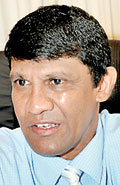News
Lions from Germany, Korea to breed new generation of cubs
View(s):Old big cats at Dehiwala Zoo to make way for young big ones; some cubs to be bred at zoo will be transferred to Safari Park
By Hansani Bandara
A new 500 acre Safari Park with a large collection of animals will be set up in Hambantota, National Zoological Gardens Director, Anura Silva said. He told the Sunday Times that phase one of the park would be open for visitors by the end of this year.
Mr. de Silva also said that a new generation of cubs will be bred at the Dehiwala Zoo with lions brought from Germany and Korea. Some of these cubs will be transferred to the new Safari Park.

Zoological Gardens Director, Anura Silva
Mr. de Silva said the younger cats would occupy the cages of the weakest and oldest of the present six lions, who will be shifted to an off-exhibit enclosure. He said these lions were sick and had lived beyond their expected lifespan of 15 years.
The director admitted space limitations meant that these lions would once again be in a caged environment. “But that is better than just killing them off,” he said, referring to a practice carried out in zoos in some countries. The Dehiwala Zoo does not euthanise aged animals but shifts them to off-exhibit areas and treats them, he said.
The zoo will receive a mated pair from Germany and another lioness from Korea in two to three months, Mr. de Silva said adding that they were gifts. China’s Shandong Zoo too has offered another pair of lions under an animal exchange programme, Mr. de Silva said.
Pubudu Weerarathne, mammal inspector and former president of the Young Zoologists Association, said the zoo was taking a step in the right direction in getting these new animals. This will facilitate the creation of a new bloodline of lions, he said adding that the immunity system of lion cubs get weaker when a pair of lions belonging to the same bloodline is repeatedly mated. “That is why cubs get sick often and die before they reach their expected lifespan.” he said.
Mr. Weerarathne said a majority of the present lions at the zoo were cubs of a pair that were brought from the controversial private zoo in Ahungalle in 1997.

The older animals at Dehiwala Zoo (above and top right) will be taken away to an off-exhibit area. Pix by Susantha Liyanawatte
Meanwhile a lion caretaker at the zoo said the big cats survived longer in captivity since they don’t have to hunt for food. “In the wilderness, if an animal gets sick it will gradually lose its strength and die of starvation unlike in a zoo where they are treated,” he said.
Follow @timesonlinelk
comments powered by Disqus

















